Dr. Stijn Thoolen is the ESA-sponsored medical doctor spending 12 months at Concordia research station in Antarctica. He facilitates a number of experiments on the effects of isolation, light deprivation, and extreme temperatures on the human body and mind. Find this blog post in the original Dutch below.
Missed part 1? Read it here.
And so we keep delivering. Questionnaires about stress, physical and mental wellbeing, questionnaires about nutrition habits, stool samples, saliva samples, blood samples, taste tests with taste strips, smell tests with ‘Sniffin’ Sticks’. I make pictures of what I am eating twice a day, and our cook records our menu a whole year long. And, perhaps best of all, we all take a sachet every day, without even knowing if it contains a probiotic supplement, or nothing but just powder…
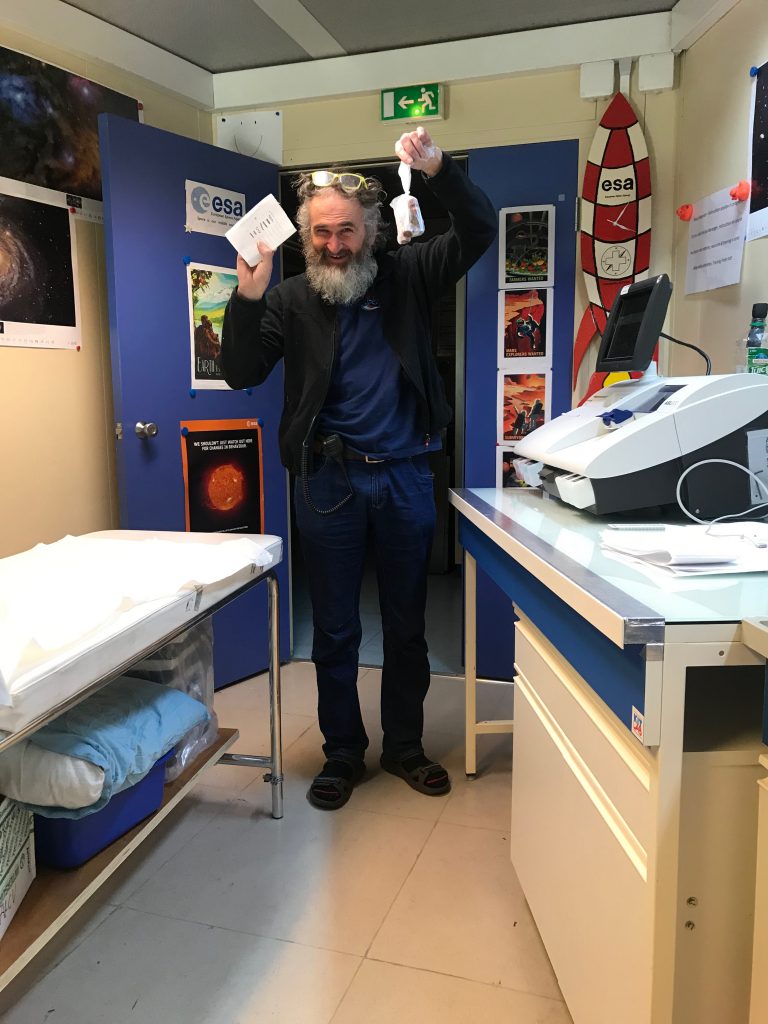
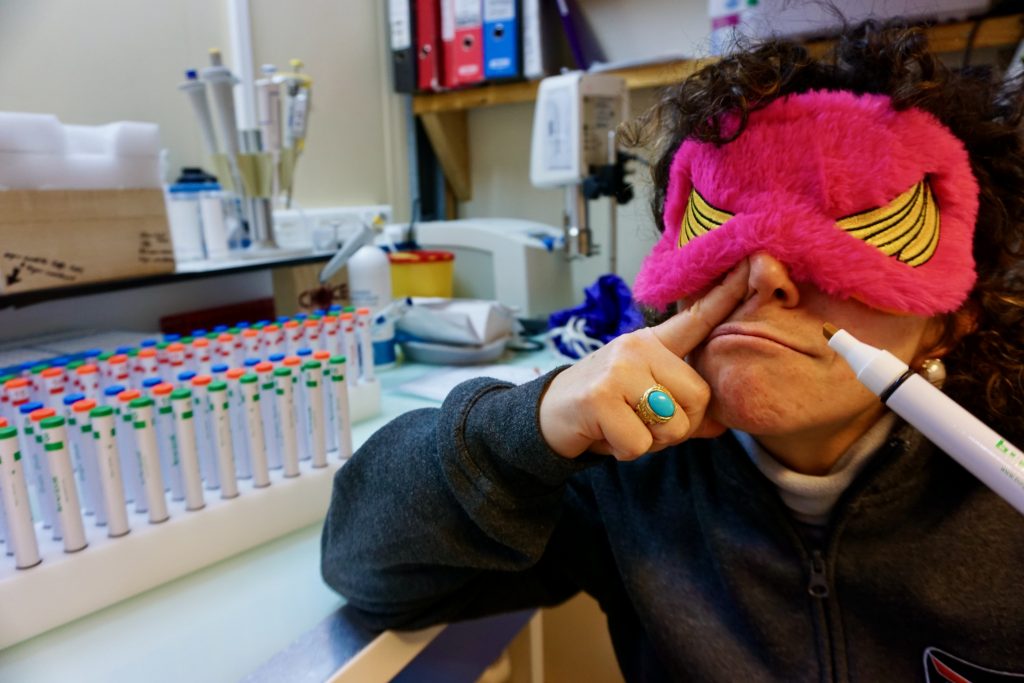
This time the tests are for another study called ICELAND (‘immune and microbiome changes in environments with limited antigen diversity’). ICELAND doesn’t focus on altitude, but instead uses the homogeneous environment of Concordia, another stressor to our body and mind, as a testbed for examining changes in immune health. Have you ever thought of the idea that, just like in Concordia or in space, a lack of new bacteria and viruses can actually deteriorate your immune system? Have you ever considered that we may be too hygienic? Just like losing muscles when we spend too much time on the couch, or losing skills if we don’t practice our brain, we can lose immune function when it is not stimulated, and according to the ‘hygiene hypothesis’ this may be one of the reasons for an increased incidence of asthma and skin inflammation in children in developed countries. In a similar way, prolonged isolation and confinement in the stressful and ‘clean’ environments of Antarctica or space is thought to increase susceptibility to infections and even allergies!
But the immune system is complex, and the many interactions it holds with other body systems such as our digestive system and our brain are just being discovered. For example, changes in nutrition can have an effect on the composition and health of our gut bacteria, which in recent years have been found to play an important role in the development of immune-related diseases such as allergies and cancer. Other studies in addition have found gut health to be related to mental wellbeing as well. So can we maintain a healthy brain and a healthy immune system if we maintain a healthy gut? We still have much to learn about ourselves, and ICELAND aims to investigate these interesting interactions. Hence those daily sachets: comparing the test outcomes between those of us who took gut bacteria-stimulating probiotics and those who didn’t can give us valuable information about its potential to counter these health risks!
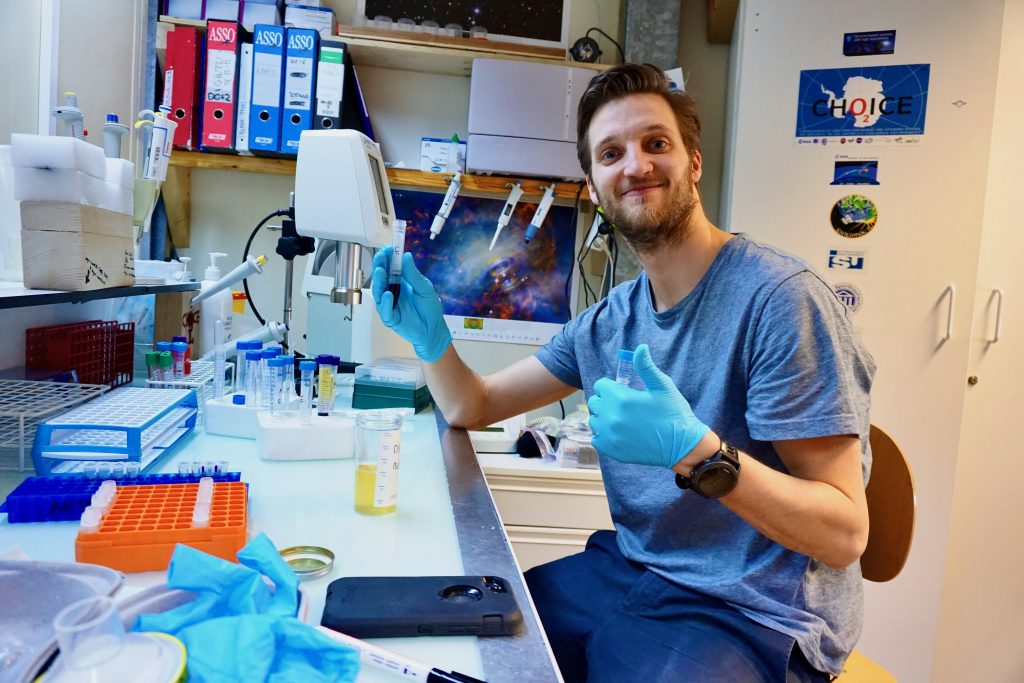
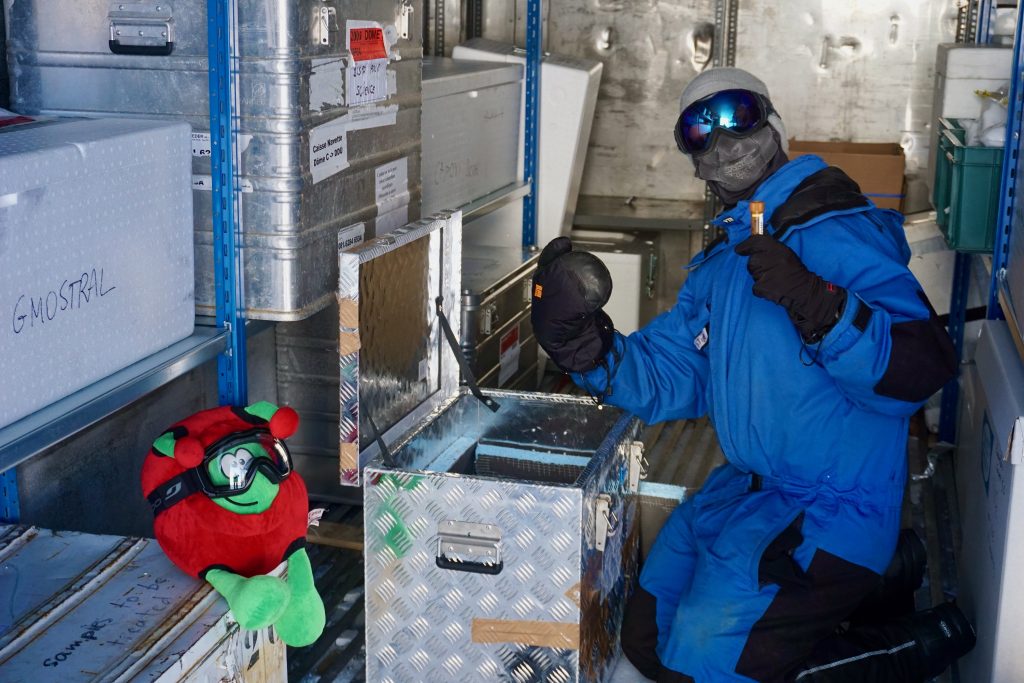
En dus blijven we het ESA-lab maar van data voorzien. Vragenlijsten over stress en over fysiek en mentaal welbevinden, vragenlijsten over voedingsgewoonten, poepmonsters, speekselmonsters, bloedmonsters, smaaktesten met ‘taste strips’, en reuktesten met ‘Sniffin’ Sticks’. Ik maak twee keer per dag foto’s van wat ik eet, en onze kok registreert het hele jaar ons menu. En, misschien het beste van allemaal, we nemen allemaal iedere dag een sachet met poeder, zonder ook maar te weten of het een probioticum bevat, of toch alleen maar poeder…
Deze keer zijn de testen voor een andere studie: ICELAND (‘immune and microbiome changes in environments with limited antigen diversity’). ICELAND is niet zozeer gefocust op de hoogte, maar gebruikt in plaats daarvan de eentonige omgeving van Concordia, een andere stressor voor onze lichaam en geest, om veranderingen in immuungezondheid te onderzoeken. Heb je er wel eens aan gedacht dat, net als in Concordia of in de ruimte, een tekort aan nieuwe bacteriën en virussen je immuunsysteem zou kunnen verzwakken? Is het wel eens in je opgekomen dat we misschien te hygiënisch zijn? Net als dat we spiermassa verliezen als we te veel tijd op de bank besteden, of vaardigheden als we onze hersenen niet blijven trainen, zo kunnen we ook immuunfunctie verliezen als het niet gestimuleerd wordt, en volgens de ‘hygiëne hypothese’ zou dit wel eens een van de redenen kunnen zijn voor het verhoogd aantal gevallen van astma en huidontstekingen in kinderen in ontwikkelde landen. Op vergelijkbare wijze wordt gedacht dat langdurige isolatie en opsluiting in de stressvolle en ‘schone’ omgeving van Antarctica of de ruimte ons op vatbaarder kan maken voor infecties en zelfs allergieën!
Maar ons immuunsysteem is complex, en de vele interacties die het aangaat met andere systemen in ons lichaam, zoals ons spijsverteringsstelsel of onze hersenen, worden nu pas ontdekt. Veranderingen in voeding bijvoorbeeld kan een effect hebben op de samenstelling van onze darmflora, waarvan de afgelopen jaren duidelijk is geworden dat het een belangrijke rol speelt bij de ontwikkeling van immuun-gerelateerde ziekten zoals allergieën en kanker. Andere studies hebben bovendien aangetoond dat darmgezondheid in relatie staat tot psychisch welbevinden. Kunnen we dan een gezond stel hersenen en een gezond immuunsysteem behouden als we goed voor onze darmen zorgen? We hebben nog veel over onszelf te leren, en ICELAND wil deze interessante interacties onderzoeken. Vandaar die dagelijkse sachets: door te testresultaten te vergelijken tussen de bemanningsleden die darmflora-stimulerende probiotica nemen en zij die het een jaar lang met slechts poeder moeten doen, leren we beter begrijpen in hoeverre zo’n probioticumsupplement ons kan helpen om deze gezondheidsrisico’s tegen te gaan!



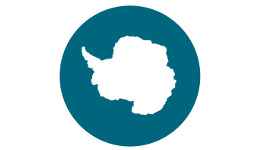
Discussion: no comments